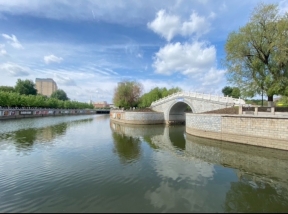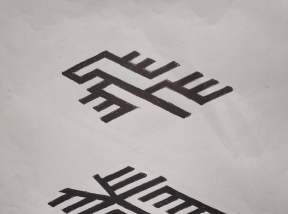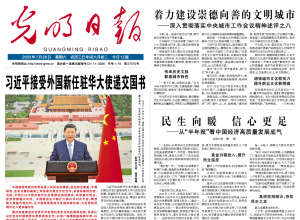本帖最后由 楊宗澤 于 2025-4-28 17:08 編輯
尤里?塔爾維特詩選(一)
楊宗澤 編譯
Selected Poems of JüRI TALVET (Set One)
Compiled and translated by Yang Zongze
三月,心中的歌
路上遇到的陌生人越來越多,
一個扎著辮子的男人
和一個留著娃娃頭的女人。
小藍魚在彼此間游動。
在巴格達,炸彈像糖果一樣從天空落下——
什么神奇的力量制造了它們?
老朋友們的臉多已消失,
他們悄悄地走了,不愿留下照片。
你好,你輕輕地嘆道。
你好,這里的海水又清又藍。
小藍魚在彼此間游動。
IN MARCH THE HEART SANG
More and more one meets strangers on the way,
a man in pigtails and a woman with a pageboy.
Little blue fish swim each other by.
In Baghdad bombs drop like candies from the sky –
what mágico prodigioso were they made by?
The faces of old friends fade away,
they quietly withdraw, picture-shy.
Hello, you said with a quiet sigh.
Hello, the water is clean and green here in our sea.
Little blue fish swim each other by.
制作椅子是一門學問
——謹以此詩紀念我親愛的朋友、詩人理查德?卡德爾,希望他明天上午十點能回來。
兔肉的味道好嗎?很好。
三文魚呢?不錯。
眼皮下的世界脈動確實是一個美妙的畫面。
(至少你可以假裝睡覺。)
物理學與詩歌的高貴聯盟:
能夠在一個溫暖的喬治亞小鎮
的酒吧凳上放松真是太好了。
(如果有座位的話。)
然而,在兩個德里,
天黑后,跪在寺廟里的一塊冰涼的石頭上
想著神靈,才能讓人從塵世的紛擾中解脫出來。
烤架上的東西味道好嗎?
我很高興。我很開心。
雞肉味道怎么樣?…
有幾個遠方來的陌生人,在遠處徘徊。
我要編一張蜘蛛網把他們罩住。
幾頭印度母牛身上
布滿黑格爾灰色的、煮沸的蜘蛛網。
(謝謝你,海因里希!)
你說你真的不走嗎?
你明天上午十點會走。
你明天上午回來。是不是?
BUILDING CHAIRS IS SCIENCE
——To the memory of dear Richard Caddel, friend and poet,
with the wish that he could return tomorrow at ten.
Did the rabbit taste good? Fine.
The salmon? Well. The world’s
pulse under your eyelids is indeed
a fine image. (At least you can
feign sleep.) The noble union
of physics with poetry: It’s fine
that one can at least relax
into the groove of a bar stool in a
warm small town in Georgia. (If
there’s room.) In both Delhis, however,
when it grows dark, only thinking
of gods in a temple, with a cool stone
in the knees, redeems one from the jungle.
Did what’s on the grill taste good? I’m glad. I
am happy. How was the chicken? I weave
a spider web for some stranger to get
caught in. Some other from far away,
on the edge. Some Indian cow,
covered with Hegel’s grey, boiled
spider web. (Thank you, Heinrich!)
You say you really won’t go? You
shall go tomorrow morning at ten.
And you will return tomorrow
2004年3月11日馬德里悲劇之后
說說吧,荷爾德林,
你洞悉萬物:
這一切可有天堂諸眾插手其中?
在巴格達的天空中,
一千顆黑色的彈丸里,
有幾顆彈回西方,
越過遺忘的帶刺圍欄。
兩個年輕女孩得救了。
死神忘了從巴士拉
兩顆深色額頭下
摘下四顆綠色的星辰。
(目光黯淡。臉龐突然只感覺到
兩只溫暖的小手:是的,現在我嚇到你了!)
然而,死神邁著傲慢的步伐
穿過直布羅陀海峽,
頭也不回。
只有大地在他身后嘎嘎作響。
在丹吉爾以東,
幾百個黯淡的靈魂
無法從石塊下獲救。
遺忘又一次筑起
它帶刺的圍欄。
(美國有線電視新聞網幾乎未提及此事。)
突然,在幾百把吉他上,
死神彈奏起它的華爾茲,
而在馬德里,
隨后狂怒起來,任性地
扯斷了琴弦。
馬德里和瓦倫西亞的人們
淚流滿面:
也許1936年從歷史博物館里
逃出來了?
西班牙人民哭泣著:
如何擺脫他們的罪惡?
羅德里戈,因為你的血腥罪孽,
胡利安伯爵讓摩爾人的戰馬
沿著內華達山脈的隘口狂奔
甚至越過了瓜達拉馬山脈!
只有巴斯克人沒有屈服,
連羅蘭伯爵本人都懼怕他們,
查理曼大帝也是如此。
如何擺脫自己的罪惡?
讓那些拒絕
向基督教方式低頭的舌頭
從嘴里被割下,
并被囚禁在博物館的玻璃之下!
(媽媽,我是讓你
無法安靜的鐘!)
After the tragedy in Madrid
on 11 March 2004
Now say, H?lderlin,
you who know all things:
do the heavenly host have their hands in this?
Of a thousand black balls
in Baghdad’s sky a couple
bounced back to the west
over the barbed fence of oblivion.
Two young girls were saved.
Death forgot to pluck out
four green stars
from below two dark foreheads in Basra.
(The glance blacked out. The face suddenly felt
only two small warm hands:
yes, now I can terrify you!)
Yet with arrogant steps
death crosses the strait of Gibraltar
without looking back.
Only the earth clatters behind.
A few hundred faded souls
east of Tanger
couldn’t be saved from under stones.
Again oblivion builds
its barbed fence.
(CNN hardly mentioned it.)
Suddenly on a few hundred guitars
death plucks its waltz
in Madrid,
but turns furious, capriciously
breaking the strings.
Tears stream down the cheeks
of the people of Madrid and Valencia:
perhaps 1936 has escaped
from the history museum?
The people of Spain weep:
how rid themselves of their evil?
Rodrigo, because of your blood-sin
Count Julián let Moors’ horses
along the passes of Sierra Nevada
cross even the Guadarrama range!
The Basques alone did not surrender,
the Margrave Roland himself feared them,
as well as the Emperor Charlemagne.
How rid oneself of one’s evil?
Let tongues that refuse
to bend to the Christian way
be cut from their mouths,
and imprisoned under glass in a museum!
(Mommy, I am the alarm clock
you cannot silence!)
跳舞的圣誕老人
這位在第42街跳舞的圣誕老人
也許就在馬佐蒂鞋店的門前
而瑪麗亞在哈得孫河岸邊認真做事
瑪麗亞?巴爾蒂拉莫,你把
你的靈魂賣給誰了?——回答呀!還有
這位有血有肉的圣誕老人
是他給你上足了發條
讓你跳起希臘或加泰羅尼亞的薩爾達納舞
還不時對著你的胡須喃喃自語
念叨著馬佐蒂鞋獨特的光澤
瑪麗亞?達奎諾,你白皙的膝蓋
永遠從喬瓦尼的視線中消失了
他不過是個老人,即便沒有
他那圣誕老人的胡須和濃密的眉毛
又或許是你,沃爾特,曾在百老匯尋覓
那些年輕高大白人男子粗壯的脖頸
當你再也找不到他們時
便留意起矮小的波多黎各人溫暖的眼神
當連他們也尋不見時,你便坐在
自家院子的丁香花下哭泣
像弗朗切斯科那樣喃喃低語
”平安,平安,平安。”
后來的T.S.艾略特也是這樣
還有古代的游吟詩人
遠在他們之前,也遠在你之前
“沙恩蒂,沙恩蒂,沙恩蒂,愿我的心安寧
也愿你的心安寧,瑪麗亞?馬科拉塔”
The Dancing Santa
This dancing Santa on 42nd Street
maybe in front of Mazzotti’s shoe shop and
Maria means business on a Hudson riverbank
Maria Bartiramo to whom have you sold
your soul? – answer! And
a living Santa who wound you up
to foot a Greek or Catalan sardana
and to mutter occasionally into your beard
something about the special shine of Mazzotti’s shoes
Maria d’Aquino the whiteness of your knees
escapes for ever from the eyes of Giovanni
He is just an old man even without
his Santa’s beard and bushy eyebrows
or maybe it’s you Walt who looked on Broadway
for the thick necks of big young white men
and when you couldn’t find them any more
then the warm eyes of small Puerto Ricans
and when you couldn’t find them either you sat down
in your own yard under a lilac and wept
and mumbled like Francesco pace
pace pace and T. S. later and the ancient bards
long time before them and before you
?ānti ?ānti ?ānti peace to my heart peace
to your heart too Maria Macolata
地鐵所見
新年前夕,我乘地鐵前往第42街時
或許是從那兒返程的途中,我看見一個高大的
年輕黑人勞工,當時他的孩子們差一點
被地鐵車廂門夾住。那個男人
用肩膀撐著門不讓它關上,
然后和他的孩子們開著玩笑。他穿著滿是油污的褲子,
一個口袋上別著卷尺,另一個口袋
露出一把水平儀。我永遠
不會忘記那個小男孩和那個小女孩
以及他們父親的眼神。世上沒有什么
比這更重要的了……
Seen On the Subway
When I went by subway for New Year’s Eve to 42nd street
or maybe on my return from there I remember a big
young black laborer whose children were about
to be caught in the compartment’s doors The man
with his whole shoulders held open the door
then joked with his kids He wore greasy trousers a tape measure
clipped to one pocket a level extending from the other I
will not forget the eyes of that little boy and of that little girl
and of their father Nothing else on earth matters at all

尤里教授照片 (可上傳).jpg (64.98 KB, 下載次數: 0)
下載附件
保存到相冊
2025-4-18 10:17 上傳
[作者簡介]尤里?塔爾韋特(JüRI TALVET):愛沙尼亞當代著名詩人、作家、翻譯家、學者。1981年獲圣彼得堡大學西班牙語哲學博士學位,1996年以來,在教學之余一直致力于一本比較文學雜志《國際文學》的編輯工作;1994到2010年間,曾任愛沙尼亞國際比較文學協會會長,1992年以來,尤里?塔爾韋特一直在愛沙尼亞塔爾圖大學任世界擔任文學教授,系國際比較文學協會執委,2016年當選歐洲科學院院士。其詩歌、散文和哲學著述被翻譯為英語、漢語、西班牙語、法語、加泰羅尼亞語、羅馬尼亞語和意大利語等十多種語言發表或出版,作品在國內外多次獲得獎項。已有詩集、散文集、哲學論述集和翻譯著作三十余部在國內外出版,其主要著作有《醒》(詩集),《來自夢,來自雪》(詩集),和《而愛,照亮我們》(詩集),《西班牙精神》(散文隨筆集),《不可逆轉的邊緣》(文化隨筆集),《文化哲學的反射》(哲學隨筆集)等。
Jüri Talvet was born in 1945 in P?rnu (Estonia). A graduate of the University of Tartu (1972) and a PhD by Leningrad (St. Petersburg) University (1981), he chaired from 1992 to 2020 World / Comparative Literature program at Tartu University, where he also founded Spanish Studies. Today he is Professor Emeritus. In 2016 he was elected member of Academia Europaea. He has published in Estonian more than twenty books of poetry and essay. His books have appeared beyond Estonian in English, Spanish, French, Italian, Russian, Romanian, Serbian, Japanese, Catalan, Greek and Macedonian translation. In Estonian, he has published a monograph on Juhan Liiv’s philosophic-lyrical poetry Juhan Liivi luule (Tallinn, 2012), while his Critical Essays on World Literature, Comparative Literature and the "Other" (Cambridge Scholars Publishing, 2019) importantly concerns aspects of ethical literary criticism. Since 1996 he has acted as the main editor of Interlitteraria, international journal for comparative literature. He has been awarded Estonian Annual Prize of Literature for essay (1986), Juhan Liiv Prize of Poetry (1997), Ivar Ivask Memorial Prize (essay, poetry, 2002) Naji Naaman International Literature Honor Prize (for complete works, 2020), Estonian National Science Prize for Lifework (2021), Jaan Kross Literary Prize (for world poetry translations, 2022), "Golden Ivy" International Poetry Prize (Fushun, China, 2022), International Aco Karamanov Poetry Prize (North-Macedonia, 2023), etc. For further data, including his full lists of publications, see http://talvet.edicypages.com/en ; https://sisu.ut.ee/ewod/t/talvet
【譯者簡介】楊宗澤 (1953 — )筆名:瘦路,山東平度人,畢業于山東師范大學外文系英美語言文學專業,中學退休教師,無黨派,中國作家協會會員,詩人,翻譯家,后意象主義詩歌流派代表性詩人之一。1999年12月被美國世界作家藝術家協會評選為1999年度最佳翻譯家,2024年12月被《中國當代詩歌導讀》編委會授予第七屆詩歌獎。已有詩集《浪漫季節》、《沉浮》和詩歌翻譯集《賀敬之短詩選》、《吉狄馬加詩選》、《桑恒昌短詩選》、《伊曼紐爾?馬休詩選》等33種著作在國內外出版。楊宗澤的詩關注人生和人性、關注現實和社會問題、關注底層社會的生存狀態。
Yang Zongze (1953 — ), his pen name: Narrow Path; was born in Pingdu City, Shandong Province; graduated from English Language and Literature Department of Shandong Normal University; retired middle school teacher; nonparty; poet, poetry translator, one of the representative poets of the post-Imagist poetry school. In December 1999, he was selected as the Best Translator of 1999 by the American Society of World Writers and Artists. In December 2024, he was awarded the title of excellent poet of the Seventh Poetry Award by the editorial board of the Guide for Reading of Chinese Contemporary Poetry. Thirty-two books of his have been published at home and abroad, including a collection of poems titled My Romantic Season and Winter Without Snow,and collections of translated poems titled Selected Poems of He Jingzhi, Selected Poems of Jidi Majia, Selected Poems of Sang Hengchang and Selected Poems of Emmanuel MAHIEU.
Yang Zongze's poetry focuses on life and human nature, realistic society and important societal issues as well as the living conditions of the bottom society.
|
|









 QQ好友和群
QQ好友和群 轉播
轉播 分享
分享 淘帖
淘帖 支持
支持 反對
反對











